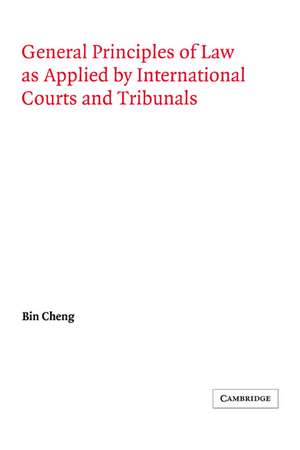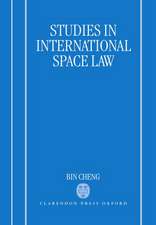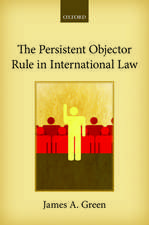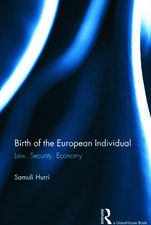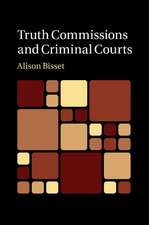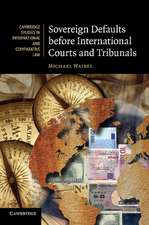General Principles of Law as Applied by International Courts and Tribunals: Grotius Classic Reprint Series
Autor Bin Cheng Cuvânt înainte de Georg Schwarzenberger Phd. Dr.JURen Limba Engleză Paperback – noi 2006
Preț: 413.46 lei
Nou
Puncte Express: 620
Preț estimativ în valută:
79.12€ • 84.60$ • 65.96£
79.12€ • 84.60$ • 65.96£
Carte tipărită la comandă
Livrare economică 17 aprilie-01 mai
Preluare comenzi: 021 569.72.76
Specificații
ISBN-13: 9780521030007
ISBN-10: 0521030005
Pagini: 544
Dimensiuni: 155 x 235 x 30 mm
Greutate: 0.75 kg
Editura: Cambridge University Press
Colecția Cambridge University Press
Seria Grotius Classic Reprint Series
Locul publicării:Cambridge, United Kingdom
ISBN-10: 0521030005
Pagini: 544
Dimensiuni: 155 x 235 x 30 mm
Greutate: 0.75 kg
Editura: Cambridge University Press
Colecția Cambridge University Press
Seria Grotius Classic Reprint Series
Locul publicării:Cambridge, United Kingdom
Cuprins
Foreword Georg Schwarzenberger; Preface; Tables; Abbreviations; Introduction; Part I. The Principle of Self-Preservation: Introductory; 1. Territorial application of the principle; 2. External application of the principle; Part II. The Principle of Good Faith: Introductory; 3. Good faith in treaty relations; 4. Good faith in the exercise of rights (the theory of abuse of rights); 5. Other applications of the principle; Part III. General Principles of Law in the Concept of Responsibility: 6. General notions; 7. The principle of individual responsibility; 8. The principle of fault; 9. The principle of integral reparation; 10. The principle of proximate causality; Part IV. General Principles of Law in Judicial Proceedings: Introductory; 11. Jurisdiction; 12. Power to determine the extent of jurisdiction (compétence de la compétence); 13. Nemo debet esse judex in propria sua causa; 14. Audiatur et altera pars; 15. Jura novit curia; 16. Proof and burden of proof; 17. The principle of res judicata; 18. Extinctive prescription; Conclusions; Appendices; Index.
Recenzii
'This is a large and methodical study of those decisions and dicta of international tribunals which disclose 'the general principles of law recognised by civilised nations' enshrined in Article 38 (1) (c) of the International Court's Statute … Dr. Cheng has joined wide research to great good sense and lucidity of study, and it is a safe prediction that this book will become a standard.' International and Comparative Law Quarterly
'In this remarkable book, Dr. Bin Cheng analyses article 38(1)(c) of the Statute of the International of Justice. His purpose is not to ascertain what the general principles of law recognized by civilized nations ought to be theoretically but rather 'to determine what they are in substance and the manner in which they have been applied by international tribunals.' … It removes much of the woolliness surrounding the phrase 'general principles of law'; it opens up a rich mine of relatively unexplored material; and its enumeration of the practical application of those general principles henceforth cannot be ignored by any international lawyer. … In the introductory and concluding pages Dr. Cheng gives free reign (with just cause) to his theoretical inclinations … The importance of these conclusions, supported as they are by a wealth of international authority, is obvious. Dr. Cheng clearly has given new meaning to the findings of the other publicists such as Corbett, Fisher Williams, Lauterpacht, and even (on a different level) Cahn. Further, it will be noticed that he has taken Dr. Schwarzenberger's operative hierarchy of sources one step back and then reversed it … this book breaks new ground. There is something here for the international, comparative, and municipal lawyer as well as for the students of jurisprudence. Every serious reader will find Dr. Cheng's analysis not merely useful but indeed intellectually exciting.' University of Toronto Law Journal
'Dr. Cheng's book deserves close study by and appreciation of all those concerned with the application of rules of international law … Dr. Cheng's work is an important and fully mature contribution to the literature of international law … he has performed a service by bringing together with these pages a mass of useful and otherwise not readily available material.' British Yearbook of International Law
'This book is an important and timely contribution to the literature on international law. The author's knowledge of international jurisprudence, his wide reading, his patient analysis of the relevant material, and his lucid writing, command one's admiration.' International Affairs
'This is a most valuable reference work for practitioners in international tribunals and diplomatic offices.' Australian Law Journal
'That he [the author] merits the gratitude of every practitioner in the field of public international law, and also in other fields, will be very obvious to anybody who has had an opportunity of resorting to this book for the purpose of finding the answer to a practical problem … excellent indexes enable the user to find quickly enough what he wants and make this book extremely serviceable … Dr. Cheng's research has been most exhaustive, his documentation is excellent, his presentation clear and concise and confined throughout to the points which really matter … There can be no doubt that this work constitutes the most important contribution made so far to the proper understanding of Article 38 (3) of the Statute. It is also a working tool which should not be missed by any practitioner in the field of public international law, and by none of those who practise in those international courts.' The Law Quarterly Review
'Certain features of Dr. Cheng's study are altogether outstanding: the thoroughness of research, the clarity of arrangement, the economy of expression, the accuracy of reference and, most commendable of all, the integrity of conclusion. At no point is one disturbed by the pleading of an untenable cause, nor is the material distorted by a disregard for the virtue of relevancy … Occasions will continue to be rare when research projects are completed with greater competence than is displayed by the author in this unusually useful study.' The Canadian Bar Review
'The last section [on general principles of law in judicial proceedings] … illustrates the wealth of legal experience and judicial tradition which has been, almost unconsciously at times, embodied by tribunals in their development of international procedure. The result is not a hotch-potch of municipal rules culled from different systems: it is a universal and hence truly international procedural grammar. … This is an admirable, balanced and most scholarly monograph, and Dr. Cheng is to be congratulated on having made an important contribution to the study of international law. But even the common lawyer, who is not primarily concerned with international law, can read this book with pleasure and profit. The Solicitor
'In this remarkable book, Dr. Bin Cheng analyses article 38(1)(c) of the Statute of the International of Justice. His purpose is not to ascertain what the general principles of law recognized by civilized nations ought to be theoretically but rather 'to determine what they are in substance and the manner in which they have been applied by international tribunals.' … It removes much of the woolliness surrounding the phrase 'general principles of law'; it opens up a rich mine of relatively unexplored material; and its enumeration of the practical application of those general principles henceforth cannot be ignored by any international lawyer. … In the introductory and concluding pages Dr. Cheng gives free reign (with just cause) to his theoretical inclinations … The importance of these conclusions, supported as they are by a wealth of international authority, is obvious. Dr. Cheng clearly has given new meaning to the findings of the other publicists such as Corbett, Fisher Williams, Lauterpacht, and even (on a different level) Cahn. Further, it will be noticed that he has taken Dr. Schwarzenberger's operative hierarchy of sources one step back and then reversed it … this book breaks new ground. There is something here for the international, comparative, and municipal lawyer as well as for the students of jurisprudence. Every serious reader will find Dr. Cheng's analysis not merely useful but indeed intellectually exciting.' University of Toronto Law Journal
'Dr. Cheng's book deserves close study by and appreciation of all those concerned with the application of rules of international law … Dr. Cheng's work is an important and fully mature contribution to the literature of international law … he has performed a service by bringing together with these pages a mass of useful and otherwise not readily available material.' British Yearbook of International Law
'This book is an important and timely contribution to the literature on international law. The author's knowledge of international jurisprudence, his wide reading, his patient analysis of the relevant material, and his lucid writing, command one's admiration.' International Affairs
'This is a most valuable reference work for practitioners in international tribunals and diplomatic offices.' Australian Law Journal
'That he [the author] merits the gratitude of every practitioner in the field of public international law, and also in other fields, will be very obvious to anybody who has had an opportunity of resorting to this book for the purpose of finding the answer to a practical problem … excellent indexes enable the user to find quickly enough what he wants and make this book extremely serviceable … Dr. Cheng's research has been most exhaustive, his documentation is excellent, his presentation clear and concise and confined throughout to the points which really matter … There can be no doubt that this work constitutes the most important contribution made so far to the proper understanding of Article 38 (3) of the Statute. It is also a working tool which should not be missed by any practitioner in the field of public international law, and by none of those who practise in those international courts.' The Law Quarterly Review
'Certain features of Dr. Cheng's study are altogether outstanding: the thoroughness of research, the clarity of arrangement, the economy of expression, the accuracy of reference and, most commendable of all, the integrity of conclusion. At no point is one disturbed by the pleading of an untenable cause, nor is the material distorted by a disregard for the virtue of relevancy … Occasions will continue to be rare when research projects are completed with greater competence than is displayed by the author in this unusually useful study.' The Canadian Bar Review
'The last section [on general principles of law in judicial proceedings] … illustrates the wealth of legal experience and judicial tradition which has been, almost unconsciously at times, embodied by tribunals in their development of international procedure. The result is not a hotch-potch of municipal rules culled from different systems: it is a universal and hence truly international procedural grammar. … This is an admirable, balanced and most scholarly monograph, and Dr. Cheng is to be congratulated on having made an important contribution to the study of international law. But even the common lawyer, who is not primarily concerned with international law, can read this book with pleasure and profit. The Solicitor
Descriere
In this book, Cheng aims to inquire into the practical application of the general principles of law by international courts and tribunals.
